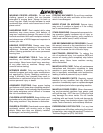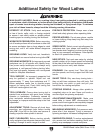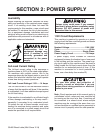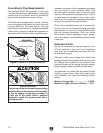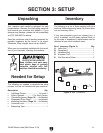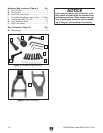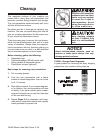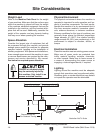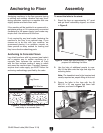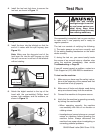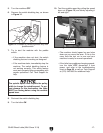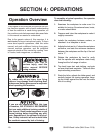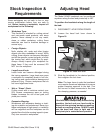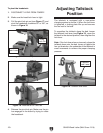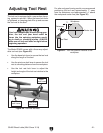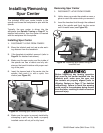
G0462 Wood Lathe (Mfd. Since 11/14)
-15-
Anchoring machinery to the floor prevents tipping
or shifting and reduces vibration that may occur
during operation, resulting in a machine that runs
slightly quieter and feels more solid.
If the machine will be installed in a commercial or
workplace setting, or if it is permanently connected
(hardwired) to the power supply, local codes may
require that it be anchored to the floor.
If not required by any local codes, fastening the
machine to the floor is an optional step. If you
choose not to do this with your machine, we
recommend placing it on machine mounts, as
these provide an easy method for leveling and
they have vibration-absorbing pads.
Anchoring to Floor
Lag shield anchors with lag screws (see below)
are a popular way to anchor machinery to a
concrete floor, because the anchors sit flush
with the floor surface, making it easy to unbolt
and move the machine later, if needed. However,
anytime local codes apply, you MUST follow the
anchoring methodology specified by the code.
Machine Base
Concrete
Lag Screw
Lag Shield Anchor
Flat Washer
Drilled Hole
Figure 8. Popular method for anchoring
machinery to a concrete floor.
Anchoring to Concrete Floors
To mount the lathe to the stand:
1. Stand the legs up approximately 41" apart
and get them reasonably aligned, as shown
in Figure 9.
Assembly
Figure 9. Stand legs approximately 41" apart to
prepare for mounting the lathe.
2. Use the help of additional people to care-
fully lift the lathe onto the legs and align the
mounting holes.
Note: The headstock end is the heaviest and
usually requires two people lifting at that end.
3. Secure the lathe to the legs with the (8)
M8-1.25 x 35 cap screws and 8mm lock
washers, as shown in Figure 10.
41"
Figure 10. Securing lathe to the stand leg.
x 8



